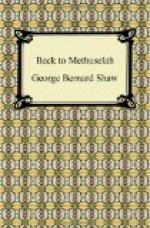or substantial. But who has ever refused to accept
a good legend with delight as a legend? The legends,
the parables, the dramas, are among the choicest treasures
of mankind. No one is ever tired of stories of
miracles. In vain did Mahomet repudiate the miracles
ascribed to him: in vain did Christ furiously
scold those who asked him to give them an exhibition
as a conjurer: in vain did the saints declare
that God chose them not for their powers but for their
weaknesses; that the humble might be exalted, and the
proud rebuked. People will have their miracles,
their stories, their heroes and heroines and saints
and martyrs and divinities to exercise their gifts
of affection, admiration, wonder, and worship, and
their Judases and devils to enable them to be angry
and yet feel that they do well to be angry. Every
one of these legends is the common heritage of the
human race; and there is only one inexorable condition
attached to their healthy enjoyment, which is that
no one shall believe them literally. The reading
of stories and delighting in them made Don Quixote
a gentleman: the believing them literally made
him a madman who slew lambs instead of feeding them.
In England today good books of Eastern religious legends
are read eagerly; and Protestants and Atheists read
Roman Catholic legends of the Saints with pleasure.
But such fare is shirked by Indians and Roman Catholics.
Freethinkers read the Bible: indeed they seem
to be its only readers now except the reluctant parsons
at the church lecterns, who communicate their discomfort
to the congregation by gargling the words in their
throats in an unnatural manner that is as repulsive
as it is unintelligible. And this is because
the imposition of the legends as literal truths at
once changes them from parables into falsehoods.
The feeling against the Bible has become so strong
at last that educated people not only refuse to outrage
their intellectual consciences by reading the legend
of Noah’s Ark, with its funny beginning about
the animals and its exquisite end about the birds:
they will not read even the chronicles of King David,
which may very well be true, and are certainly more
candid than the official biographies of our contemporary
monarchs.
WHAT TO DO WITH THE LEGENDS
What we should do, then, is to pool our legends and make a delightful stock of religious folk-lore on an honest basis for all mankind. With our minds freed from pretence and falsehood we could enter into the heritage of all the faiths. China would share her sages with Spain, and Spain her saints with China. The Ulster man who now gives his son an unmerciful thrashing if the boy is so tactless as to ask how the evening and the morning could be the first day before the sun was created, or to betray an innocent calf-love for the Virgin Mary, would buy him a bookful of legends of the creation and of mothers of God from all parts of the world, and be very glad to find his laddie as




